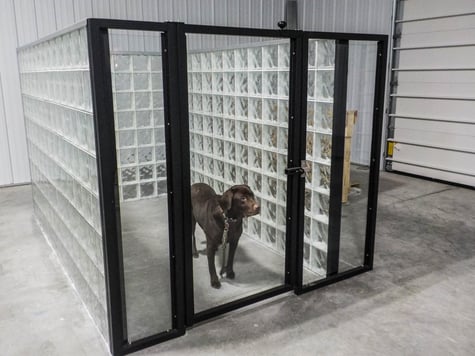Glass Block is Perfect for Veterinarian Offices and Shelters
Glass block as a construction material has gained considerable interest from designers and architects in recent years. Used as an aesthetically pleasing cladding to create award-winning buildings around the world, architects and interior designers have found that glass block and glass brick offer many practical and functional advantages that other building materials do not. Light admission and diffusion, transparency, beauty, strength, durability, and sustainability are principal motivators for using modern glass block for interior and exterior structures.
Glass Block Walls, Partitions, and Kennels
Two other venues where glass block can yield dividends are veterinary offices and animal shelters. Replacing dingy enclosed cages with bright and natural light-admitting glass block or glass brick reduces the harmful effects of causing otherwise calm animals to panic due to limited visibility and light. Studies have shown that some dogs experience the same severe mental stress when caged as people do when placed in solitary confinement. Dogs that are not able to see beyond the opaque walls of a standard kennel sometimes express anxiety by turning in circles, becoming aggressive toward people, while showing separation anxiety and fearfulness.
These negative behaviors in an animal shelter can turn potential owners away from an otherwise well-behaved dog.
Glass block kennels installed with durable, tempered glass doors will allow abundant light to enter and eliminate the sense of isolation. The more open environment enables the dog to see and sense activity around them and reduce the feeling of isolation.

Veterinarian Offices Layouts
Vet facilities tend to be highly compartmentalized, similar to the way human doctors’ offices are designed. Besides the waiting rooms, which are sometimes divided into sections to keep animals separated, vet offices usually have several examination rooms depending on the size of the operation and number of animals that may be treated at one time. Quite often, as with human medical facilities, clients and their pets are waiting in one room while another examination and consultation are being conducted in another. When more than one veterinarian is on duty, the office can seem like a giant maze with several tiny examination rooms and offices.
Animal Shelters: Budget Concerns
Animal shelters usually consist of a reception area behind which is the large room where the animals abide in various types of kennels and cages. Since shelters are usually working under severe budget restraints, little attention is paid to making the environment light and airy. Often the kennel area is rather dingy and inadequately lit with artificial light sources.
Managing the budget for light and heat is a priority, and metal, concrete, or wooden kennels do not permit sufficient light and usually do not provide much insulation.
Glass block walls and kennels allow natural and artificial light to pass through to sufficiently illuminate every area with fewer light sources. Using the natural light that passes through the perimeter windows and the walls of each kennel, energy savings can be significant.
Similarly, since glass block, often with a hollow center, is an excellent insulator, the cost of energy for heating and cooling can be reduced.
And, as mentioned, a shelter dog that has a clearer view of the surroundings and better lighting will not feel as threatened while staying in glass block kennels. As a result, their behavior should improve, and dogs will have a better chance of being adopted sooner.
What Do Vet Offices Require?
Veterinarian offices with the usual arrangement of several small rooms should require four conditions:
- Privacy: Because consultations and communications are personal, walls should not conduct sound from one room to the next.
- Cleanliness: The walls should be easy to clean to keep bacteria levels under control.
- Light: The entire facility should be well illuminated and inviting. Most rooms in a vet office are interior rooms, so natural light is not an option for many. If all rooms are to be used, every space should be well lit.
- Fireproof: Glass block will not combust as wooden paneled walls do.
Glass block rooms and partitions address each of these challenges more than sufficiently.
- Glass block does not conduct sound. Block is usually produced from two halves fused together around a vacuum cavity. As a result, glass block will not conduct sound.
- Animal facilities can become very messy in a short time. Hair, dirt, and the entire spectrum of dog and cat germs can accumulate quickly. To be as sanitary as any medical or boarding facility must be, floors, walls, and doors must frequently be cleaned. Glass block walls are far easier to clean than drywall or other surfaces. Just wiping the glass block with a sanitized cleaner will eliminate smears and bacteria that is common to these facilities.
- With standard panel walls, every space requires its own light source. This situation creates a higher demand for energy. Glass block, however, which is available in varying degrees of transparency and color, and selection of shapes will admit light from external locations without compromising privacy. As a result, less energy is required to keep the veterinarian office well illuminated. While still needed at night, the number of artificial light sources can be reduced.
- Glass block products are inflammable.
Contact GBA Architectural Products + Services
GBA Architectural Products + Services has partnered with the world’s most advanced glass block and brick manufacturers. Since 1985, the experts at GBA Architectural Products have provided state-of-the-art solutions for a wide range of residences, businesses, and municipalities. Collaborating on unique designs, the GBA technicians advise, plan, and install glass architectural products, like glass block pavement lights, throughout North America.
Visit the GBA website to witness some of their unique creations and gain ideas for your applications.
Call GBA Architectural Products + Services at one of the three numbers listed below:
● East Coast: (212)-255-5787
● Midwest: (877)-280-7700
● West Coast: (213)-634-7050
Or, you may fill in the basic information form on the Contact Us page, and one of the GBA professionals will contact you.

